What is Eczema?
Eczema is a skin condition, which is also referred to as dermatitis. This condition is very common among babies and young children. However, eczema can also affect adults. Those who suffer from eczema experience severe itchiness in the affected area. This itchiness is often so intense that the affected person is unable to control the urge to scratch the area. Constant scratching of the itchy area leads to soreness and bleeding. Such open wounds often become infected and inflamed as well. In some cases, mild eczema persists throughout the person's life.
Symptoms of Eczema
Discoloured Patches on the Skin
The affected portions of the skin often become discoloured. In most cases, they become dark brown or red in colour. Eczema often develops on the arms or on the areas behind the knees. These areas often become much darker than the normal skin of the person. Such discoloured patches make the skin look rather unsightly.
Severe Itching
Itching is one of the earliest symptoms of eczema. The affected area of the skin becomes extremely itchy and this causes the affected person to suffer from a severe urge to scratch the area. In most cases, this urge is so intense that the patient gives in and scratches the area repeatedly, as a result of which, bleeding takes place. The Mayo Clinic also states the same fact. In most cases, the symptom of itchiness worsens at night and this disturbs the sleep of the patient as well.
Oozing of the Red Bumps
The affected portions of the skin often develop numerous bumps, which are red in colour. These bumps are very tiny and often start oozing. They secrete a sticky fluid, which tends to make the affected skin even itchier than before. It is important to keep such skin dry so as to prevent the occurrence of fungal or bacterial infections. When these bumps start drying, they form a crust-like layer on the skin and this crust eventually falls off.
Causes of Eczema
Genetic Factors
The National Institute of Arthritis and Musculoskeletal and Skin Diseases states that people who have a family history of hay fever or asthma are more likely to suffer from eczema than those who do not have a family history of such problems. This proves that such conditions are hereditary. There is a protein, which is called cytokine. This protein is responsible for the proper functioning of the immune system. When the body is deficient in this protein, the immune system responds to every stimuli and this often triggers outbreaks of eczema.
Pollutants in the Atmosphere
It has been stated by the 'National Eczema Association for Science and Education' that people who are living in cities are more likely to develop eczema than those who live in rural areas. This is because the urban areas are much more polluted than the rural areas and so the skin can react to the pollutants that are present in city air.
Skin Irritations
Skin irritations often trigger certain types of eczema. In some cases, the skin of the patient does not react immediately to the allergen. It can take up to several months or even a year for such reactions to result in eczema. This has been stated by the American Academy of Dermatology. Common skin irritants include battery acid, nickel and yeast.
Types of Eczema
Atopic Dermatitis
Atopic dermatitis is the most common form of eczema. Children are very prone to suffering from this condition. However, adults can also develop atopic dermatitis, especially if they have a family history of hay fever or asthma. Atopic dermatitis causes the patient to develop red rashes on certain portions of the skin. These rashes are extremely itchy and often secrete a sticky fluid. In the later stages of eczema, the affected portions of skin become thick and dry.
Contact Dermatitis
Contact dermatitis is a condition, which develops when the skin of the person reacts to certain allergens. Common allergens include detergents and pollutants. The affected skin becomes deep red in colour and swells up as well. Oozing is also a common symptom of contact dermatitis. The affected individual must try to avoid contact with the allergen, in the future.
Seborrheic Dermatitis
Such cases of eczema are common in extreme climatic conditions. Very cold weather or very dry weather can cause a person to have an outbreak of seborrheic dermatitis. In most cases, seborrheic dermatitis first affects the scalp of the person and then spreads to the hands and face. The affected portions of skin become extremely itchy. They often become swollen as well and the patient experiences severe burning in the area.
Home Remedies for Eczema
Licorice
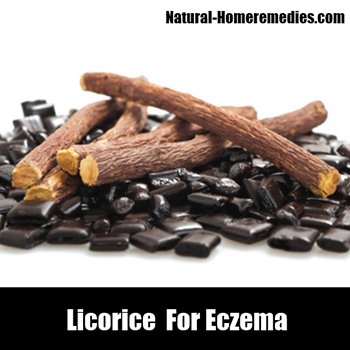 The University of Maryland Medical Center states that licorice is an herb that may prove effective in reducing the symptoms of eczema. According to a research study published in Journal of Dermatological Treatment' in the year 2003, it was observed that using a topical gel containing 2 per cent licorice was helpful in reducing itchiness as well as water blisters associated with eczema over a span of two weeks. According to the lead author M. Saeedi, licorice may prove to be an effective remedy for treating atopic dermatitis. Dr. Linda B. White, author of The Herbal Drugstore' states that a British research study showed that this herb, when consumed in the form of tea by children, proved to be effective in relieving the symptoms associated with eczema. This effect of licorice on eczema is attributed to the anti-inflammatory properties possessed by it. You can apply licorice gel to the affected areas twice daily for relieving itchiness and inflammation. If you do not have access to licorice gel, you could also soak a soft cloth in licorice tea and apply it to the affected areas.
The University of Maryland Medical Center states that licorice is an herb that may prove effective in reducing the symptoms of eczema. According to a research study published in Journal of Dermatological Treatment' in the year 2003, it was observed that using a topical gel containing 2 per cent licorice was helpful in reducing itchiness as well as water blisters associated with eczema over a span of two weeks. According to the lead author M. Saeedi, licorice may prove to be an effective remedy for treating atopic dermatitis. Dr. Linda B. White, author of The Herbal Drugstore' states that a British research study showed that this herb, when consumed in the form of tea by children, proved to be effective in relieving the symptoms associated with eczema. This effect of licorice on eczema is attributed to the anti-inflammatory properties possessed by it. You can apply licorice gel to the affected areas twice daily for relieving itchiness and inflammation. If you do not have access to licorice gel, you could also soak a soft cloth in licorice tea and apply it to the affected areas.
Chamomile
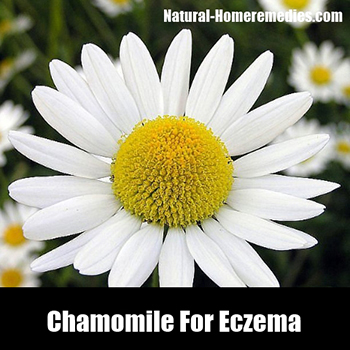 Chamomile is an herb that may prove effective in treating eczema. MedlinePlus states that chamomile can be applied topically to the affected areas to experience relief from skin conditions such as eczema. According to a research study published in European Journal of Medical Research', it was observed that using a cream containing chamomile extract was more effective in treating the symptoms of eczema compared to a cream containing 0.5 per cent hydrocortisone. MedlinePlus states that this herb may prove safe when applied to the skin topically, however, avoid using this herb if you have any kind of skin irritation.
Chamomile is an herb that may prove effective in treating eczema. MedlinePlus states that chamomile can be applied topically to the affected areas to experience relief from skin conditions such as eczema. According to a research study published in European Journal of Medical Research', it was observed that using a cream containing chamomile extract was more effective in treating the symptoms of eczema compared to a cream containing 0.5 per cent hydrocortisone. MedlinePlus states that this herb may prove safe when applied to the skin topically, however, avoid using this herb if you have any kind of skin irritation.
Red Clover
 Red clover is an herb that is commonly used in the preparation of topical creams for skin conditions such as eczema. Red clover is an herb that possesses high amounts of minerals, isoflavones as well as vitamin C. The University of Maryland Medical Center states that you should apply a cream containing 15 to 20 per cent red clover heads to the affected areas of your skin, if you are suffering from eczema. However, it is important to note that you should avoid applying this herbal cream to cracked skin and avoid using this herb if you suffer from any irritation. Red clover is known to exhibit anti-inflammatory properties, which attribute to the effectiveness of this herb on the symptoms of eczema.
Red clover is an herb that is commonly used in the preparation of topical creams for skin conditions such as eczema. Red clover is an herb that possesses high amounts of minerals, isoflavones as well as vitamin C. The University of Maryland Medical Center states that you should apply a cream containing 15 to 20 per cent red clover heads to the affected areas of your skin, if you are suffering from eczema. However, it is important to note that you should avoid applying this herbal cream to cracked skin and avoid using this herb if you suffer from any irritation. Red clover is known to exhibit anti-inflammatory properties, which attribute to the effectiveness of this herb on the symptoms of eczema.
St. John's Wort
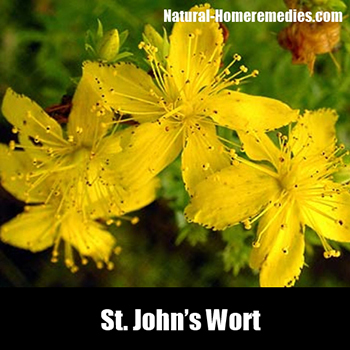 The University of Maryland Medical Center states that St. John's wort may also prove effective in the treatment of eczema, when applied topically to the skin. St. John's wort is an herb that possesses hypericin, which is a chemical substance that exhibits anti-inflammatory properties. The University of Pittsburgh Medical Center states that a research study conducted on 21 individuals suffering from eczema showed that this herb was effective in relieving the symptoms associated with this condition.
The University of Maryland Medical Center states that St. John's wort may also prove effective in the treatment of eczema, when applied topically to the skin. St. John's wort is an herb that possesses hypericin, which is a chemical substance that exhibits anti-inflammatory properties. The University of Pittsburgh Medical Center states that a research study conducted on 21 individuals suffering from eczema showed that this herb was effective in relieving the symptoms associated with this condition.
Gotu Kola
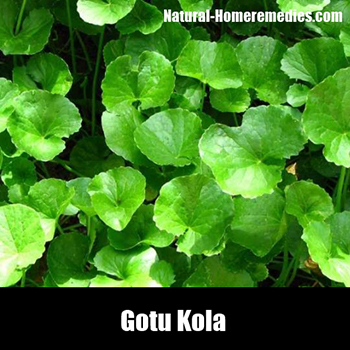 Countries such as India, China and Europe have made use of gotu kola for centuries to treat several skin conditions, including eczema. Western herbalists have also used this herb extensively for treating inflammatory conditions such as rheumatoid arthritis as well as eczema. This is due to the fact that this herb exhibits strong anti-inflammatory properties. Gotu kola is known to contain saponins, which are responsible for healing wounds. The American Cancer Society states that animal studies have shown that saponins are helpful in promoting the production of collagen as well as speeding up healing in the body. To treat eczema with gotu kola, you should prepare gotu kola tea and apply a soft cloth soaked in this tea to the affected areas of your skin. To prepare this tea, add one teaspoon of the dried root of this herb in a cup of water and allow it to steep for around 15 minutes. Wait for the tea to cool and then apply the soaked cloth to the surface of your skin. Apply the cloth over the affected areas twice each day.
Countries such as India, China and Europe have made use of gotu kola for centuries to treat several skin conditions, including eczema. Western herbalists have also used this herb extensively for treating inflammatory conditions such as rheumatoid arthritis as well as eczema. This is due to the fact that this herb exhibits strong anti-inflammatory properties. Gotu kola is known to contain saponins, which are responsible for healing wounds. The American Cancer Society states that animal studies have shown that saponins are helpful in promoting the production of collagen as well as speeding up healing in the body. To treat eczema with gotu kola, you should prepare gotu kola tea and apply a soft cloth soaked in this tea to the affected areas of your skin. To prepare this tea, add one teaspoon of the dried root of this herb in a cup of water and allow it to steep for around 15 minutes. Wait for the tea to cool and then apply the soaked cloth to the surface of your skin. Apply the cloth over the affected areas twice each day.
Manuka Honey
 Manuka honey is a type of honey that is considered extremely beneficial in treating numerous health ailments, as it possesses antiseptic properties. Manuka honey is known to possess high amounts of methylglyoxal, which is a compound responsible for the antiseptic properties possessed by this home remedy. Manuka honey is considered beneficial in preventing infections in the open wounds, which commonly occur when a person suffers from eczema. According to a research study conducted in the year 2004, it was observed that manuka honey was effective in reducing red and scaly spots that develop due to eczema. Similar to other home remedy, manuka honey is not helpful in curing this condition, but is effective in controlling the symptoms associated with it. Before using manuka honey in the treatment of eczema, it is highly recommended that you consult your physician regarding its appropriate usage.
Manuka honey is a type of honey that is considered extremely beneficial in treating numerous health ailments, as it possesses antiseptic properties. Manuka honey is known to possess high amounts of methylglyoxal, which is a compound responsible for the antiseptic properties possessed by this home remedy. Manuka honey is considered beneficial in preventing infections in the open wounds, which commonly occur when a person suffers from eczema. According to a research study conducted in the year 2004, it was observed that manuka honey was effective in reducing red and scaly spots that develop due to eczema. Similar to other home remedy, manuka honey is not helpful in curing this condition, but is effective in controlling the symptoms associated with it. Before using manuka honey in the treatment of eczema, it is highly recommended that you consult your physician regarding its appropriate usage.
Witch Hazel
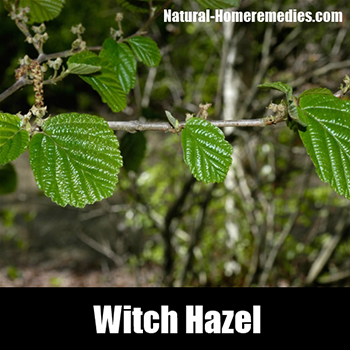 The University Of Maryland Medical Center states that witch hazel is very effective in curbing the oozing of the blisters. Such oozing is a common symptom, which is associated with eczema. In such cases, it is recommended that you use the liquid form of this herb due to its quick action on the problem. Witch hazel also helps to counter the symptom of itching, which is associated with eczema. It is important to apply this herb to the skin on a regular basis in order to get relief from the symptoms of this condition.
The University Of Maryland Medical Center states that witch hazel is very effective in curbing the oozing of the blisters. Such oozing is a common symptom, which is associated with eczema. In such cases, it is recommended that you use the liquid form of this herb due to its quick action on the problem. Witch hazel also helps to counter the symptom of itching, which is associated with eczema. It is important to apply this herb to the skin on a regular basis in order to get relief from the symptoms of this condition.
Evening Primrose Oil
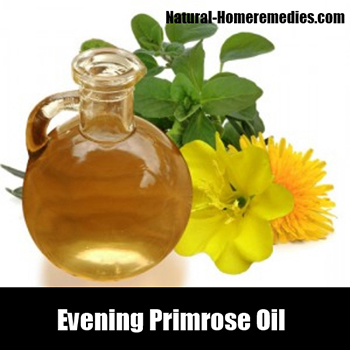 This essential oil must be consumed orally in order for it to be effective in the treatment of this condition. However, the University of Maryland Medical Center recommends the consumption of this essential oil only under the guidance of your physician as the oil can cause side effects in the body. The University of Michigan Health System states that the effectiveness of evening primrose oil is due to the fact that it contains gamma-linolenic acid. It has been discovered that most of those who are suffering from eczema are deficient in this acid.
This essential oil must be consumed orally in order for it to be effective in the treatment of this condition. However, the University of Maryland Medical Center recommends the consumption of this essential oil only under the guidance of your physician as the oil can cause side effects in the body. The University of Michigan Health System states that the effectiveness of evening primrose oil is due to the fact that it contains gamma-linolenic acid. It has been discovered that most of those who are suffering from eczema are deficient in this acid.
Green Tea
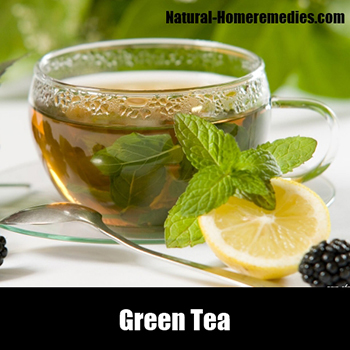 Green tea is extremely effective in the treatment of eczema as it contains antioxidants. Those who are suffering from eczema must consume this tea on a regular basis. It helps to strengthen the immune system and so the body is able to fight against the inflammation more effectively. Make sure to drink this tea at least five or six times each day.
Green tea is extremely effective in the treatment of eczema as it contains antioxidants. Those who are suffering from eczema must consume this tea on a regular basis. It helps to strengthen the immune system and so the body is able to fight against the inflammation more effectively. Make sure to drink this tea at least five or six times each day.
Aloe Vera
.jpg) Aloe vera is an ideal remedy in such cases. Most people prefer to use aloe vera gel as a topical lotion. This gel can be applied to the affected areas of your skin. It is important to leave this gel in place for at least a few hours so as to facilitate absorption. The affected people can also consume aloe vera juice internally. This juice has a cooling effect on the body and helps to promote healing. It is a powerful antiseptic and brings about quick healing of the open wounds that develop on the skin due to eczema. Make sure to consult your physician before making use of aloe vera juice or supplements in order to get the accurate dosage.
Aloe vera is an ideal remedy in such cases. Most people prefer to use aloe vera gel as a topical lotion. This gel can be applied to the affected areas of your skin. It is important to leave this gel in place for at least a few hours so as to facilitate absorption. The affected people can also consume aloe vera juice internally. This juice has a cooling effect on the body and helps to promote healing. It is a powerful antiseptic and brings about quick healing of the open wounds that develop on the skin due to eczema. Make sure to consult your physician before making use of aloe vera juice or supplements in order to get the accurate dosage.
Other Home Remedies for Eczema
- Apply some coconut oil over the affected areas of your skin. This will help in moistening the skin.
- Soak a few cotton balls in witch hazel extract and dab them on the affected areas of your skin. This will help in reducing itchiness as well as inflammation associated with eczema.
- Apply the juice derived from the leaves of spearmint to the affected areas. This will help in reducing the symptoms of eczema.
- Applying mashed papaya seeds to the affected areas has also proven beneficial in reducing itchiness associated with eczema.
- Make a paste from a teaspoon of turmeric and neem leaf juice. Apply this paste to the affected areas of your skin. This paste is helpful in reducing the symptoms of eczema.
- Add equal amounts of comfrey root, slippery elm bark and white oat bark to two cups of water and allow it to steep for around half an hour. Allow the tea to cool. Soak a soft cloth in the tea and cover the affected areas with it.
- Take a few almond leaves and crush them. Following that, add them to some water so as to form a thick paste. Apply this paste to the affected areas of your skin. This paste is considered effective in reducing the symptoms of eczema.
- Cold water is also considered beneficial in the treatment of eczema. Apply cold compress to the affected areas twice each day or as many times as you want. Cold water is helpful in reducing the itchiness and inflammation associated with eczema.
- Add a teaspoon of camphor to the same amount of sandalwood paste. Apply the paste to the affected areas. This remedy is helpful in relieving eczema.
- Apply the juice derived from aloe vera to the affected areas of your skin. This herb is helpful in reducing inflammation and itchiness associated with eczema.
Diet for Eczema
Consume Foods with Omega 3 Fatty Acids
Eczema is a condition that is associated with inflammation as well as irritation of the surface of your skin. Consuming foods with anti-inflammatory properties help in reducing the inflammation associated with eczema. In their book Alternative Medicine: The Definitive Guide', authors Larry Trivieri and John Anderson state that symptoms of eczema may occur as a result of deficiency of omega 3 fatty acids and the inclusion of foods containing these nutrients in your diet may prove effective in controlling the symptoms of this condition effectively. Paul Pitchford, author of Healing with Whole Foods' also states that deterred metabolism of fats may result in skin diseases, including eczema. The National Institutes of Health state that essential fatty acids help in reducing inflammation, thereby treating eczema. Foods that contain omega 3 fatty acids include mackerel, herring, olive oil, salmon, tuna and spirulina.
Drink Enough Water
Consuming enough water is essential when it comes to treating skin conditions such as eczema. Drinking enough water is helpful in flushing out the toxins present in the body and may prevent the occurrence of any infection along with this condition. Make sure to consume about six to eight glasses of water on a daily basis. If you lead a very active life, you must consume more water in order to compensate for the loss of water through sweat.
Eczema Prevention
When it comes to preventing eczema flare-ups, it is crucial that you avoid common allergens that may aggravate the symptoms of this condition. Some of the most common irritants include bubble baths, solvents, wool, nylon, grass, sand and soaps. Pollens, animal dander, house dust mites and certain foods may also trigger symptoms of eczema, in certain individuals. When bathing, it is important that you use warm water and avoid the use of hot water as it can aggravate the skin, thereby worsening the symptoms of eczema.
Other Treatment Options for Eczema
Vitamins
Vitamin A is a vitamin that is considered effective in boosting the immunity and maintaining as well as repairing damaged skin tissue. Vitamin A is known to exhibit antioxidant properties that help in protecting the skin from damage triggered by harmful free radicals. Skin conditions such as eczema are known to occur as a result of a deficiency of this vitamin. Foods that contain high amounts of this vitamin include broccoli, carrots, apricots, yellow squash, pumpkin, kale and asparagus. Vitamin C is a water-soluble vitamin that is known to play a crucial role in the execution of almost 300 processes that take place in the body. This vitamin is known to exhibit anti-inflammatory and antioxidant properties that help in reducing the symptoms of eczema. Foods that contain high amounts of vitamin C include oranges, lemons, berries and green leafy vegetables. Vitamin D is also known to exhibit antioxidant properties and helps in protecting the skin from damage caused by UV rays. This vitamin is also effective in the treatment of certain symptoms such as itchiness, redness and dryness, which are commonly associated with eczema. Foods that contain high amounts of vitamin D include dairy products, fish oil, eggs and fatty fish. Vitamin E is used extensively in the preparation of topical treatments for eczema as it helps in reducing inflammation and dryness. This is due to the fact that vitamin E exhibits anti-inflammatory and antioxidant properties. Foods that contain high amounts of vitamin E include nuts, dark green leafy vegetables, nuts, seeds, whole grain and legumes.
Benadryl
Benadryl is known to an antihistamine and can be consumed orally as recommended by your physician. Benadryl cream may also be applied to the affected areas of your skin. This antihistamine is considered effective in preventing the occurrence of infections. It helps in drying the wet areas of your skin and reduces inflammation as well as itchiness.
Dermarest
Drugs.com states that dermarest cream possesses hydrocortisone, which is a topical steroid that helps in reducing inflammation, redness as well as itchiness that may occur in different parts of the body. To treat eczema using this topical treatment, apply a thin layer of this cream to the surface of your skin and allow it to dry. However, it is highly recommended that you allow the affected areas to air out and avoid using a bandage. This is due to the fact that covering the affected areas increases the amount of hydrocortisone absorbed by the body, which can trigger several harmful effects. It is highly recommended that you use this topical treatment as prescribed by your physician. It is important to note that if the skin is dry and cracked, you must avoid making use of this cream.
